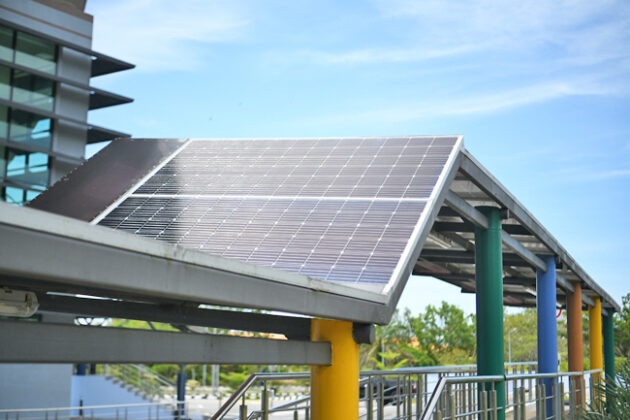


Universities are shaping the future of the green economy, and Universiti Brunei Darussalam (UBD) is translating that vision into action.
By integrating sustainability into its courses, research, and campus operations, UBD equips students with the knowledge, skills, and practical experience needed to innovate in a rapidly changing world.
This approach aligns with Brunei’s national focus on teachers as catalysts for sustainable and innovative education, recognising that educators play a pivotal role in nurturing students who are not only knowledgeable but also ethical, compassionate, and environmentally conscious.
From green technology and renewable energy to eco-tourism and climate resilience, UBD students are prepared to understand environmental challenges and actively contribute to solutions that support a sustainable economy.
Embedding Sustainability Across Education
Sustainability is a core principle across UBD’s academic offerings, ensuring graduates are well-prepared for both professional careers and civic responsibility.
Courses are interdisciplinary, reflecting the complex challenges of sustainable development.
The Faculty of Arts and Social Sciences (FASS) offers a Bachelor of Arts in Environmental Studies, where students explore human-environment interactions, conservation, environmental law, and sustainable resource management. Graduates are equipped to work in environmental assessment, consultancy, green business, and policy development.
At the postgraduate level, the Master of Arts in Geography, Environment and Development (GED) emphasises sustainable urban planning, environmental management, and research-based problem-solving, preparing students for careers that contribute directly to Brunei’s sustainability ambitions.
Science and engineering students benefit from specialised modules in green technology, renewable energy, and energy efficiency, supported by the Centre for Advanced Material and Energy Sciences (CAMES).
Here, research in renewable energy and sustainable materials links theory to practical application, providing students with hands-on experience addressing pressing environmental challenges.
Prospective educators are also a priority. The Master of Teaching (MTeach) programme at the Sultan Hassanal Bolkiah Institute of Education (SHBIE) ensures future teachers can integrate environmental literacy into classrooms.
UBD also champions lifelong learning. The Centre for Lifelong Learning (C3L) offers micro-credential modules focused on the UN Sustainable Development Goals (SDGs) and sustainable development, equipping professionals with knowledge and skills to apply sustainable practices in various sectors.
Infrastructure as a Living Laboratory
Sustainability at UBD extends far beyond the classroom. The campus itself functions as a living laboratory for energy efficiency and environmental stewardship.
LED lighting, smart building systems, automated climate control, and solar panels reduce energy consumption and carbon emissions. Water management and waste reduction systems further minimise environmental impact, making the campus a model of sustainable infrastructure.
The UBD Botanical Research Centre (BRC), located within a rare Kerangas forest, is home to more than 500 tropical plant species and serves as a hub for research and conservation.
Green spaces across the campus provide habitats for native flora and fauna, while offering students opportunities to engage directly with biodiversity management and ecological research.
Sustainable mobility is also emphasised. Pedestrian-friendly walkways, bike paths, and carpooling options encourage low-carbon transport, complementing the Healthy University Roadmap, which promotes both physical activity and mental well-being.
Weekly Wednesday Wellness Days combine exercise with community building, reinforcing a holistic campus culture where sustainability, health, and social engagement intersect.
Digital tools support waste reduction and resource efficiency. Through Canvas LMS and QR code systems, UBD minimises paper use, while recycling initiatives like the Paper Recycling Project and the ‘Recycle All Kinds, Sustain All’ (RAKSA) programme encourage students and staff to recycle plastics, aluminium, paper, and organic waste, cultivating a culture of shared environmental responsibility.
Research and Innovation Driving the Green Economy
UBD is home to a wide range of sustainability research projects addressing pressing local and global challenges. Interdisciplinary teams work on green hydrogen, solar energy, CO₂ capture, and water treatment, translating scientific innovation into solutions that support Brunei’s sustainable economy.
The Sustainability Living Lab exemplifies UBD’s practical approach, using the campus as a real-world environment for testing sustainable initiatives. Researchers, students, and staff collaborate to implement solutions that improve operational efficiency, environmental performance, and national sustainability outcomes.
Global partnerships enhance the university’s impact. The Institute for Biodiversity and Environmental Research (IBER) collaborates with institutions such as SMART, NTU, NUS, and the Brunei Forestry Department to monitor carbon stocks and ecosystem changes in tropical peat swamps.
These ecosystems store significant carbon reserves, making their conservation crucial to mitigating climate change. Findings inform management and conservation strategies, linking academic research with national policy and practical environmental protection.
Recognition and Leadership
UBD’s comprehensive approach has earned international recognition. The university is consistently featured in QS Sustainability Rankings and Times Higher Education (THE) assessments, reflecting its leadership in sustainability education, research, and campus management.
By integrating sustainability into its curriculum, infrastructure, research and outreach, UBD equips students with the skills, knowledge and practical experience needed to contribute meaningfully to a sustainable economy.
Graduates emerge as environmentally literate professionals prepared to innovate across sectors—from green technology and eco-tourism to urban planning and policy development.
Through its holistic approach, UBD demonstrates how higher education can foster sustainable economic growth.
The combination of strong academic programmes, forward-looking infrastructure, research excellence, and community engagement prepares students not only to respond to today’s environmental challenges but also to lead tomorrow’s green economy.
As the Sultanate advances its vision for a greener future, UBD exemplifies how sustainability can be integrated across all levels of education.
By nurturing environmentally conscious minds and equipping future leaders with the skills to act, the university is helping to shape a resilient generation capable of driving meaningful change for Brunei and beyond.
-- Courtesy of Borneo Bulletin